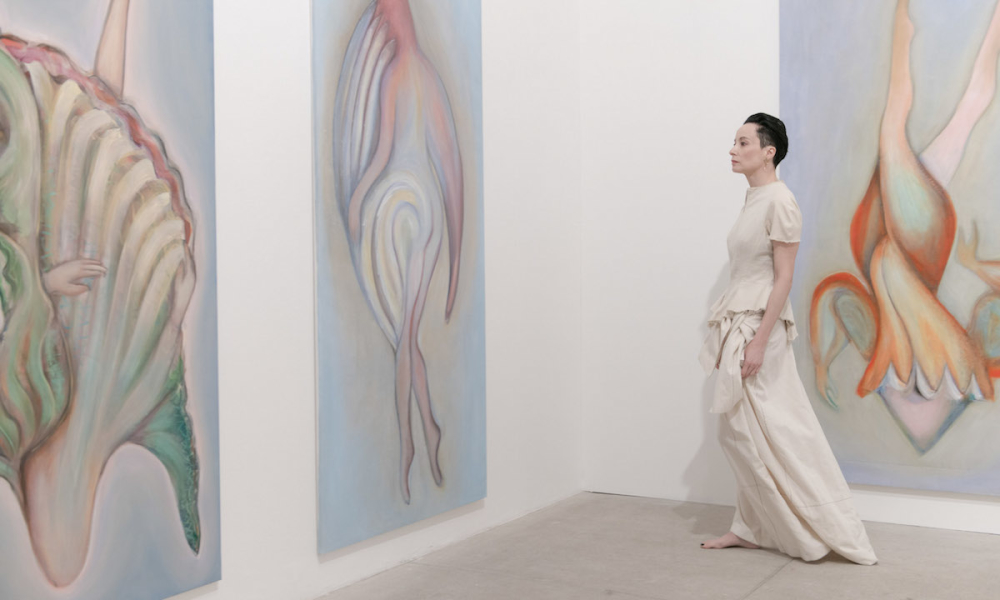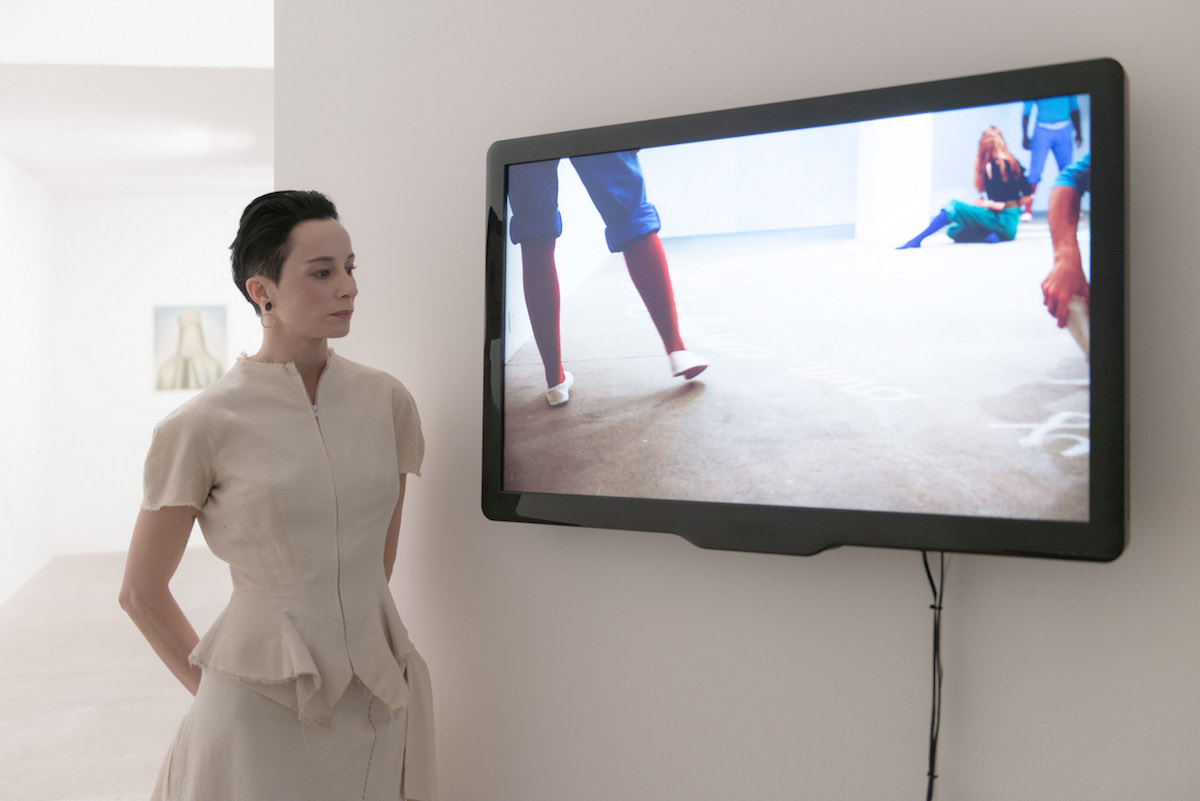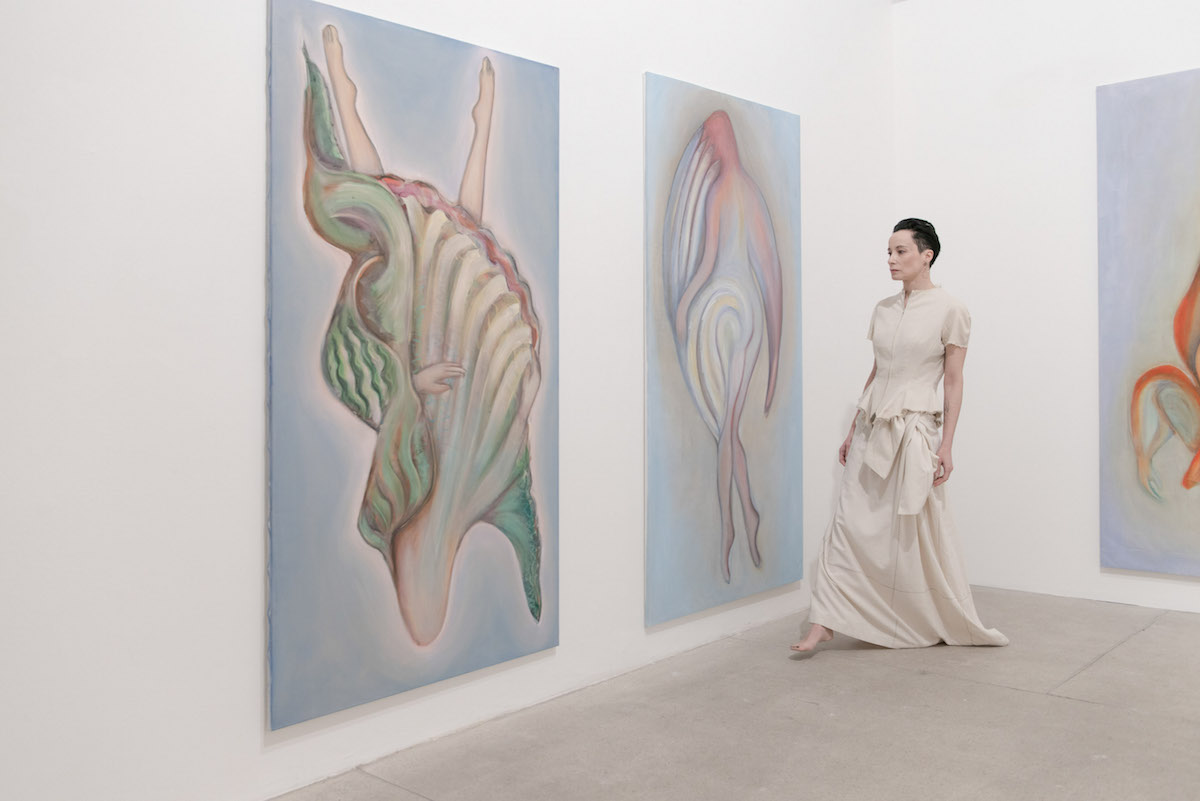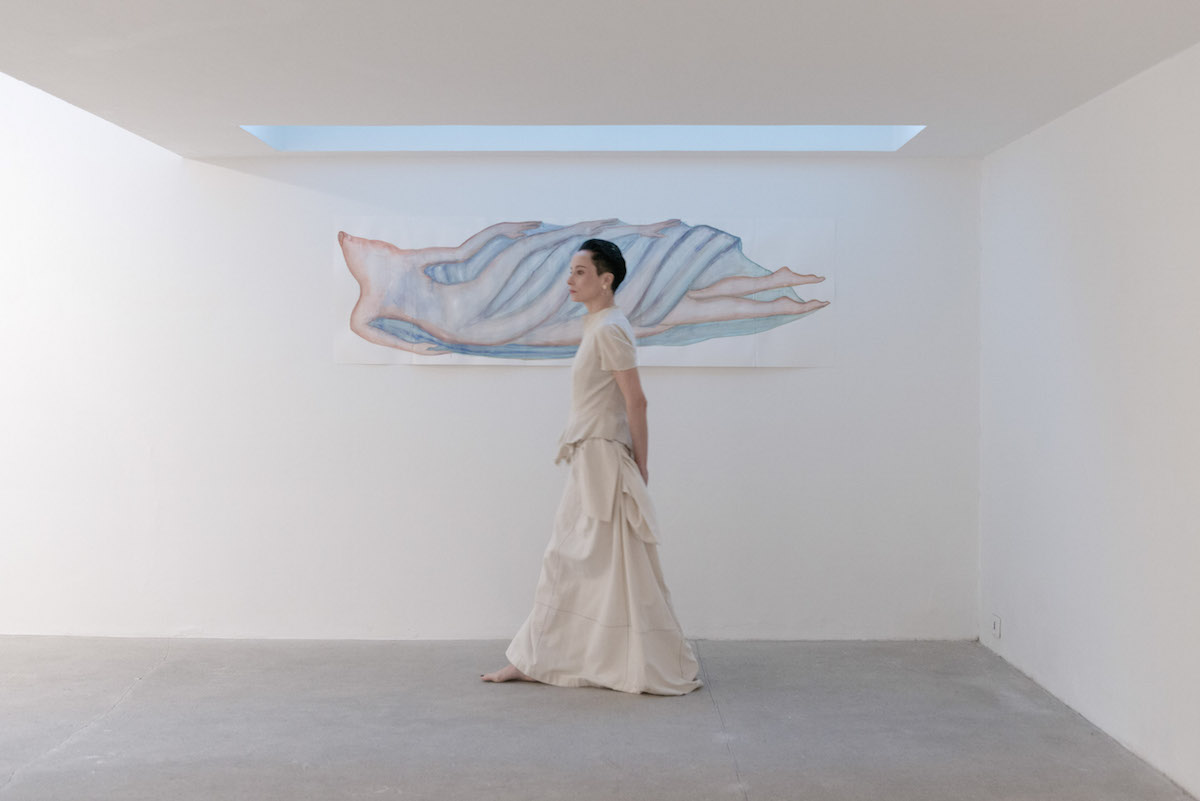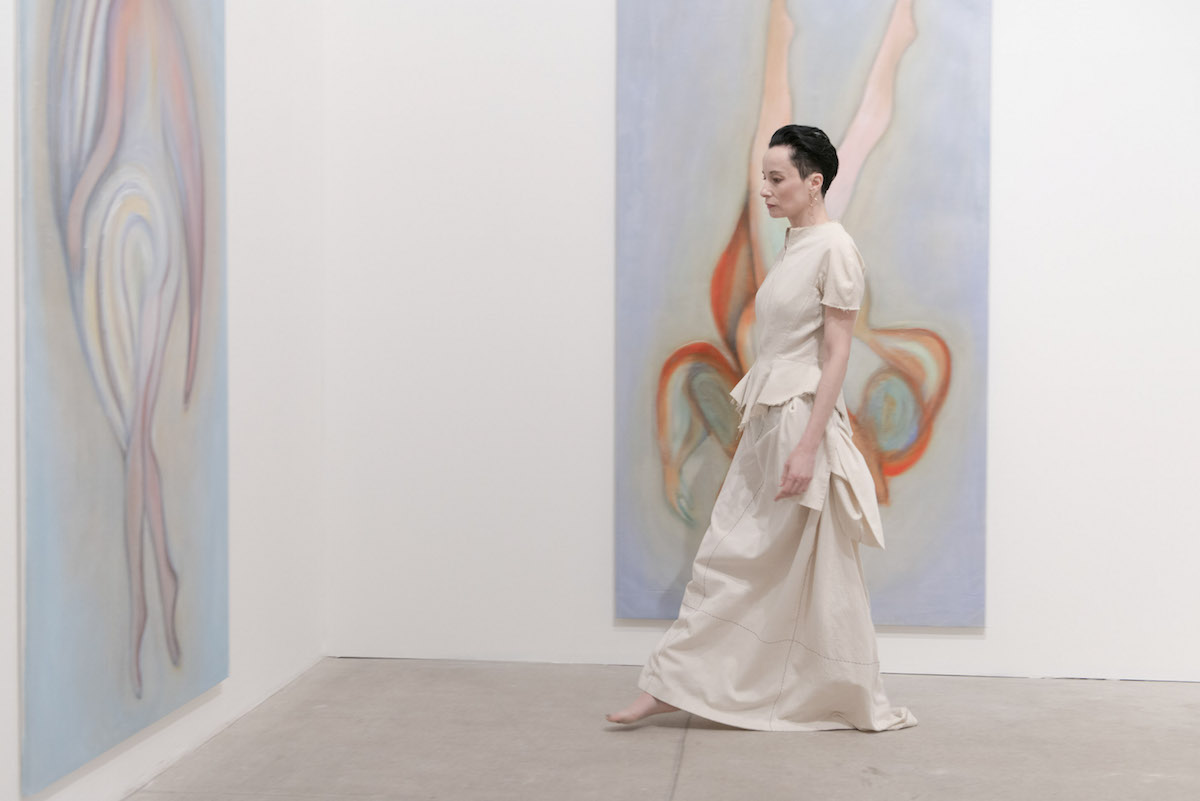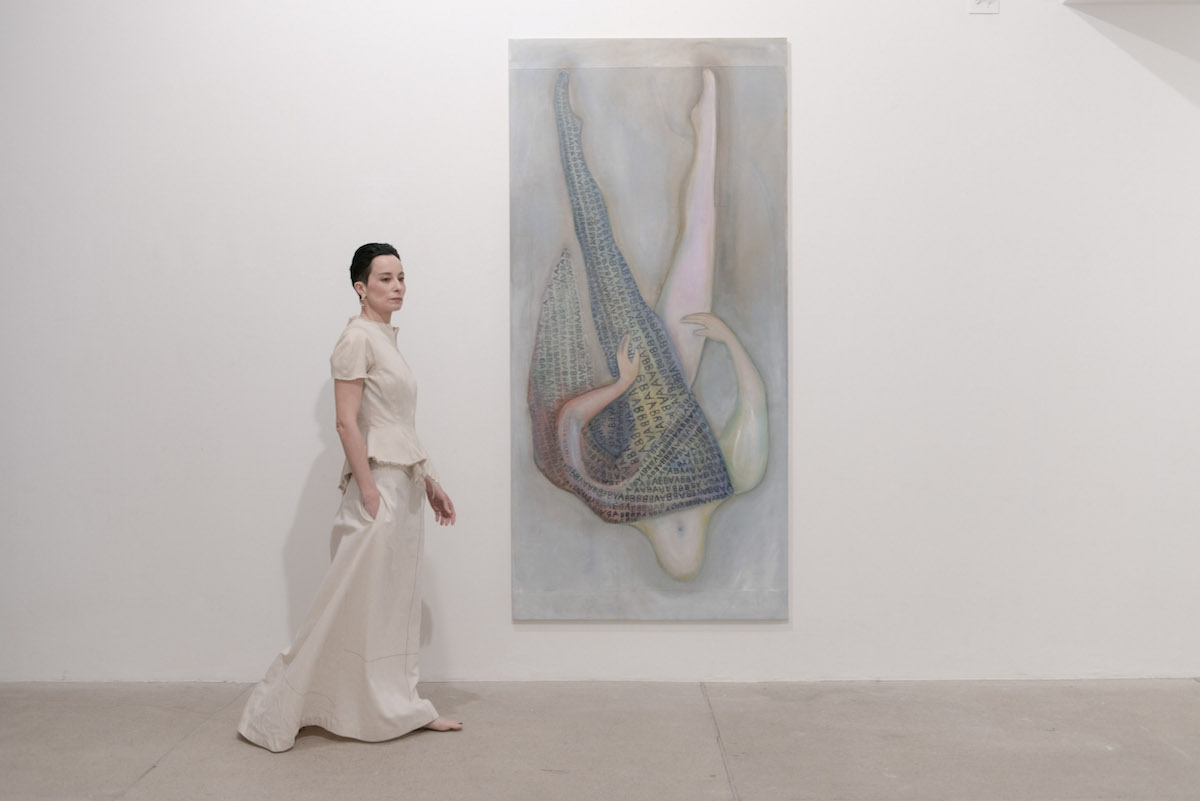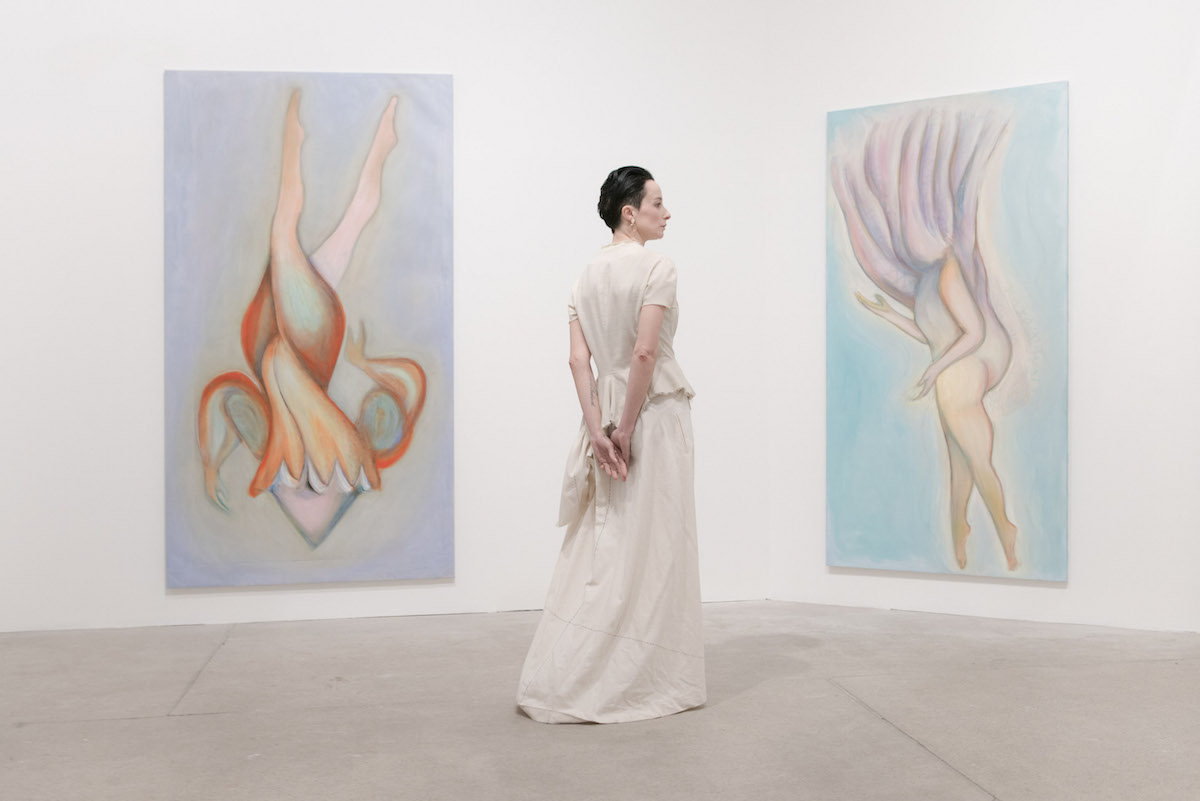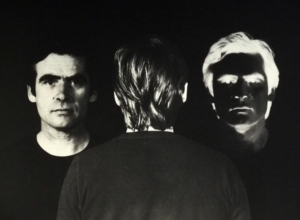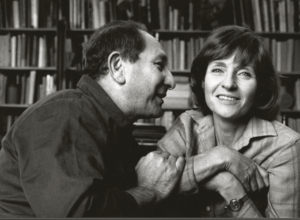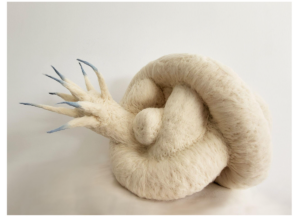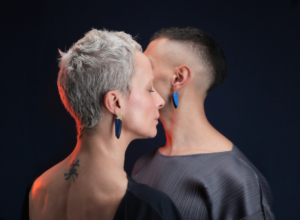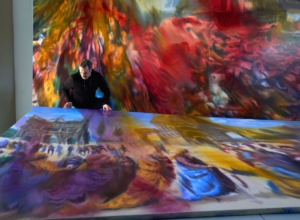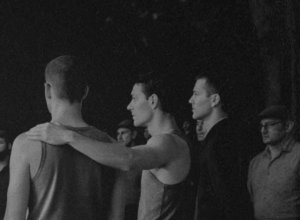Un video in cui due ballerini di valzer danzano dentro lo spazio della galleria, cancellando con il loro movimento lettere e segni sul pavimento, introduce una sequenza di dipinti che sembra simile allo scenario di un sogno, un fluire di figure immaginifiche le cui trame sono strettamente interdipendenti.
Nella spaziatura che si crea tra le due realtà il senso multiplo di un racconto che pare dipanarsi in una dimensione altra, un territorio del conscio e dell’inconscio, tra fisico e metafisico, tra materiale e immateriale.
Galleria Raffaella Cortese ha appena inaugurato la terza personale dell’artista francese Mathilde Rosier dal titolo “Impersonal Empire, The Buds” in contemporanea alla partecipazione dell’artista a Metamorfosi, la collettiva a cura di Chus Martinez al Castello di Rivoli, e alla presentazione del progetto espositivo “Figures of Climax of the Impersonal Empire” alla Fondazione Guido Lodovico Luzzatto, dimora storica del letterato e critico d’arte milanese.
Nata a Parigi nel 1973, Mathilde Rosier vive e lavora in un piccolo paese della Borgogna immersa in una solitudine che lei stessa definisce necessaria a meglio comprendere le cose. L’esito della sua ricerca artistica genera, attraverso la pittura, la performance, la musica e i video, atmosfere intime e suggestive che intenzionalmente rinunciano a logica e razionalità in favore di quella che potrebbe essere definita una momentanea perdita delle usuali facoltà percettive, molto legata all’esperienza anche fisica di antichi riti e rituali.
E’ la sublime messa in scena di un regno impersonale, quella a cui si assiste in galleria, dove i volti si dissolvono e il linguaggio si mescola. Perché solo quando è slegata dall’identità, slegata dalla narrazione e dalla sua interpretazione, l’esperienza del vivere è in grado di elevarsi dal piano individuale a quello universale, dal singolare al plurale, perdendo le sue caratteristiche di unicità e diventando sentimento puro di esistenza. Acquisendo un dinamismo che può essere paragonato a un germogliare continuo e che sfugge, per stessa definizione, a qualsivoglia rappresentazione.
E’ un soggetto trasceso quello in mostra il cui volto non necessita di essere rivelato, al pari dell’alfabeto. Scrive Mathilde Rosier in un passaggio del testo redatto per questa occasione: “E’ una forma di resistenza all’ordine generale del mondo. Essere marginalizzati per fede e scelta. Coloro che vivono ai margini sono trasparenti dal momento che non prendono parte allo spettacolo, alla società dello spettacolo. Non hanno maschera, non hanno Persona. Difatti il volto è una maschera sociale e coloro che stanno ai margini non hanno volto, ma ciò nonostante esistono ed esistono intensamente.”
L’installazione di grandi dipinti a olio su tela appartenenti alla serie Blind Swim rivela figure piene di una grazia sovrannaturale, non ancora plasmate da strutture culturali e sociali e perciò più affini al mondo degli animali. Figure che ondeggiando nell’aria, spesso capovolte, vibranti di movimento, di forza e di amore e che agiscono nello spazio creando un’ atmosfera ovattata di silenzio: un invito alla meditazione e alla presa di distanza. Necessarie perché, in questa epoca di diffidenza generalizzata, tutto deve essere analizzato in maniera critica da una lontananza che ci rende dimentichi del corpo e del tempo ma consapevoli della nostra finitudine, del nostro essere soltanto piccola porzione di qualcosa che è molto più vasto e il cui scopo è indeterminato.
Nell’indagare il peso del volto e del linguaggio e creando una dimensione senza ingombro e senza materialità in cui queste forme nuove si muovono, l’artista solleva la questione della funzione stessa della pittura, e dell’arte, nel tempo presente permeato di raziocino e tecnicizzazione. E invita a sollevare lo sguardo. E invita a una riflessione che anela al senso profondo dell’esistenza e che restituisce, a chi la sa cogliere, l’esultanza della scoperta stessa. Il profondo dentro di noi.
Foto di Elisabetta Brian
Mathilde Rosier “Impersonal Empire, The Buds”
Galleria Raffaella Cortese, Via A. Sradella 7 Milano web site – Facebook – Instagram
14 marzo – 5 maggio 2018 | martedì – sabato h. 10:00-13:00/15:00-19:30 e su appuntamento
MATHILDE ROSIER: IMPERSONAL EMPIRE, THE BUDS (English text)
A video in which two waltz dancers perform in the gallery, erasing with their movement the letters and the signs on the floor, introduces a sequence of paintings that resemble a dream scene, a flow of imaginary figures whose storylines are tightly interdependent. In the space originating between the two realities is to be found the multiple meaning of a tale that seems to disentangle in a different dimension, in a land of conscious and unconscious, of physical and metaphysical, of material and immaterial.
Raffaella Cortese Gallery has just inaugurated “Impersonal Empire, The Buds” the third solo exhibition by the French artist Mathilde Rosier, coinciding to her participation in “Metamorfosi” the collective show by Chus Martinez at Castello di Rivoli, and to the presentation of the expositive project “Figures of Climax of the Impersonal Empire” at Guido Lodovico Luzzatto Foundation, the historical residence of the Milanese intellectual and art critic.
Born in Paris in 1973, Mathilde Rosier lives and works in a small village in Burgundy immersed in a loneliness which she defines as essential to understand things better. Through painting, performance, music and videos, the result of her artistic research generates intimate and evocative atmospheres which intentionally give up logic and rationality in favor of what could be depicted as a temporary loss of the usual perceptual faculties, closely connected to the experience, even physical, of ancient rites and rituals.
It is the sublime mise-en-scene of an impersonal empire to be seen in the gallery, where faces dissolve and language mingles. Because it is only when untied from identity, unbound from the narration and its interpretation, that experience of living is able to elevate from the individual to the universal level, from singular to plural, losing its uniqueness and becoming a sheer feeling of existence. It acquires a dynamism that can be compared to a constant germination and which, for its own definition, escapes any representation.
It shows a transcendent subject whose face doesn’t need to be revealed, like the alphabet. As a matter of fact, Mathilde Rosier writes in an excerpt from the text written for this exhibition:
“This is a form of resistance to the general order of the world. To be marginalized by fate and by choice. Those who live on the margins are transparent, as they do not take part to the spectacle, to the society of spectacle. Therefore they have no mask, and no Persona. As a matter of fact, faces are social masks, and those who live on the margins have no faces; nevertheless they exist, and they exist intensely.”
The installation of big oils on canvas that belong to the series Blind Swim reveals figures of supernatural gracefulness, not yet shaped by social or cultural structures and therefore closer to the animal world. Figures fluctuating in the air, often upside-down, quivering with power and love, figures that act through the space creating a muffled, silent atmosphere: a call for meditation and distancing from oneself. It is essential now, because in this age of general mistrust everything should be critically analyzed from a distance that make us unmindful of our body or time, but aware of the finiteness of our being only a small portion of something that is immensely vast and whose aim is undetermined.
By investigating the role of faces and language and creating a non-oppressive and non-material dimension in which these new figures move, the artist raises the question about what function painting and art itself have in this present time, permeated with rationality and technology. It is an incitement to look upwards. It encourages a meditation that longs for the deep meaning of existence and that gives in return, to whom can grasp it, the elation of the revelation itself. The profoundness inside of us.


